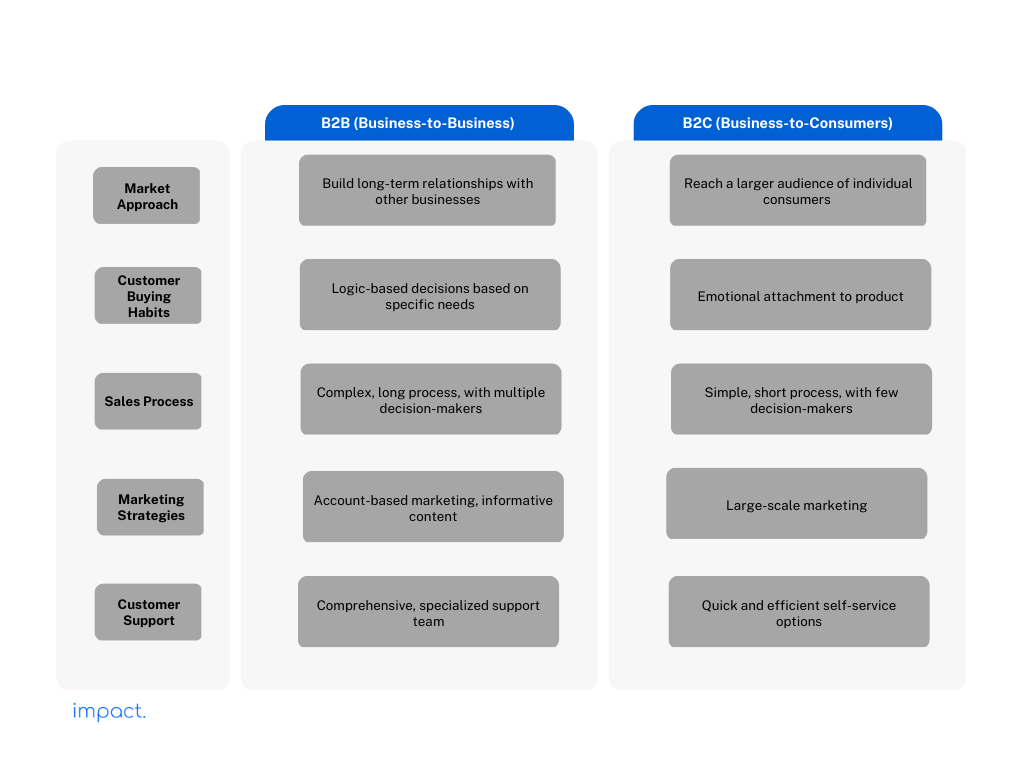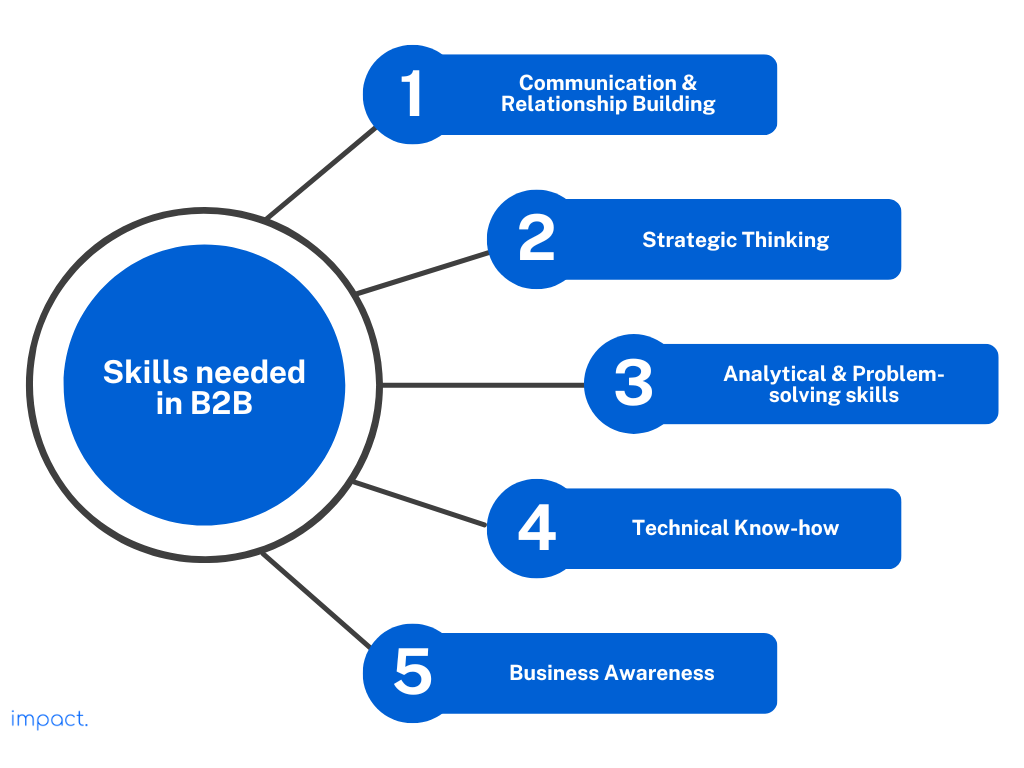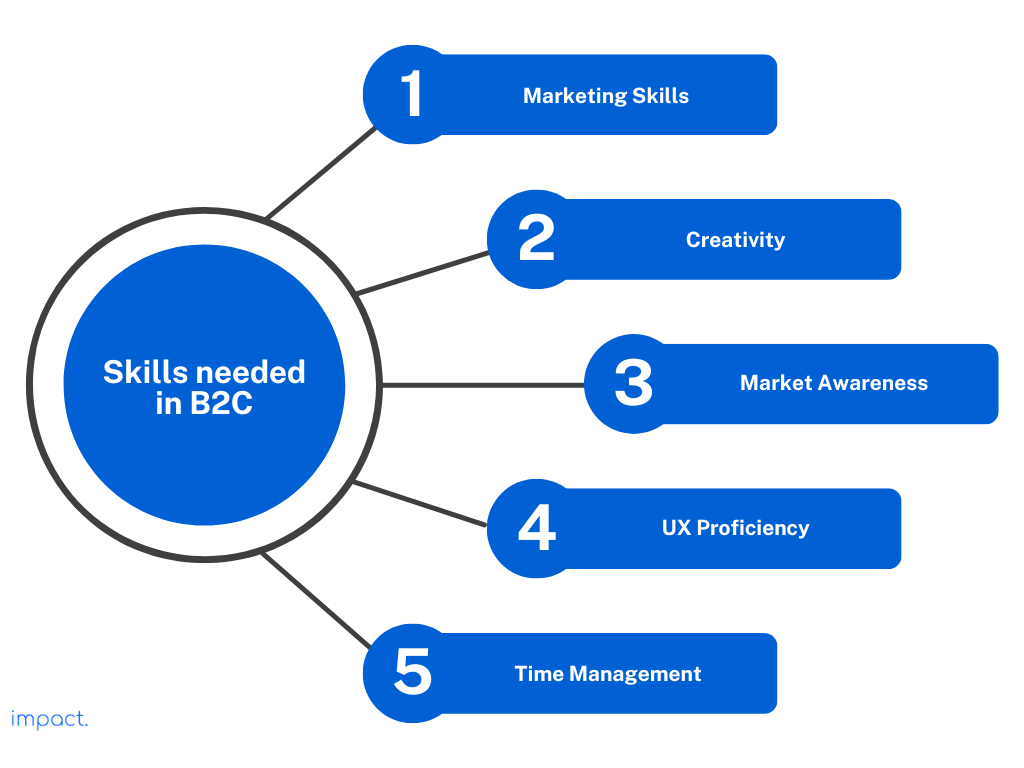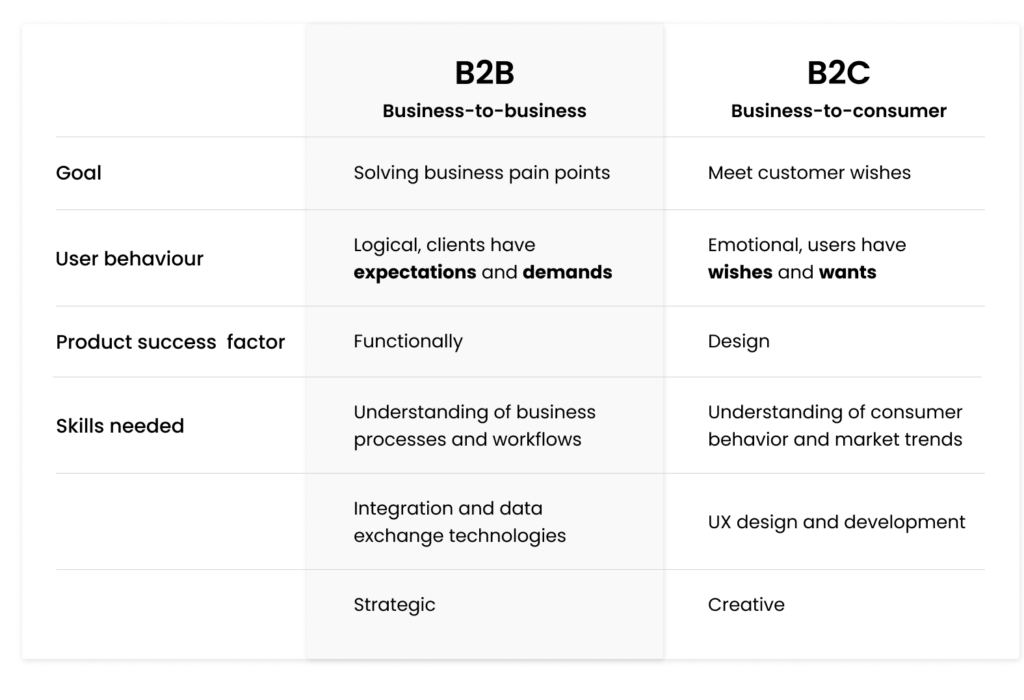Kanban: Definition, 6 Rules, and its Benefits
Kanban is a crucial part of the Just in Time (JIT) system, which we discussed…
Sean Thobias
May 17, 2025Are you curious about the differences between business-to-business (B2B) and business-to-consumer (B2C) companies? Did you know these two models have distinct differences that can impact everything from sales strategies to customer support?
For instance, while B2B companies typically focus on building long-term relationships with other businesses and organizations, B2C companies often emphasize the importance of reaching individual consumers through mass marketing.
Suppose you’re someone interested in entering the tech industry. In that case, it’s essential to understand these differences and how they can impact your career.
This article will deeply dive into the five differences between B2B and B2C companies, including their business models, market approach, customer needs, sales process, and customer support. We’ll provide concrete examples to help illustrate how these differences manifest in practice, and we’ll also provide the required skills needed to work in these companies.
By the end of this article, you will better understand the unique challenges and opportunities presented by B2B and B2C companies, which will equip you to make more informed decisions about your career path in the technology industry.
Before further detailing the differences between B2B and B2C, we must understand each definition.
Business-to-business (B2B) is a type of commerce where one business sells products or services to another business or organization. In other words, B2B transactions happen between companies, governments, or institutions.
B2B transactions usually involve more giant quantities of goods or services. The sales process can take longer and be more complex than other types of transactions.
Factors such as the company’s nature, target customers, and industry influence the business model of a B2B company. Some common business models that B2B companies include:
Intermediary-centric: This model involves a business selling its product to another company and charging an additional fee as a middleman. This strategy generates revenue to sustain operations in the long run. While the model may not be immediately profitable due to high costs, it can establish brand value by offering exclusive and valuable services to customers.
Since B2C companies sell their products or services directly to individual consumers, their business model differs from that of B2B companies. Here are some common business model types used by B2C companies:
B2B and B2C companies have different ways of doing business. B2B companies work to build long-term relationships with other businesses and prioritize offering solutions that are customized to meet their specific needs.
B2B companies focus on logic-based buying habits, emphasizing needs rather than an emotional attachment to a product.
On the other hand, B2C tech companies aim to reach a larger audience of individual consumers with a more general approach. These companies focus on branding and emotional appeal by crafting messaging that resonates with their target audience’s values and aspirations.
B2B and B2C companies have different strategies. B2B companies prioritize understanding their industry’s target audience’s needs and behavior.
One popular B2B marketing strategy is account-based marketing (ABM). It targets high-value accounts with personalized campaigns that address their specific needs. B2B marketers also create informative content such as white papers, case studies, and webinars to establish themselves as industry leaders.
On the other hand, B2C marketing targets large-scale marketing efforts that aim to capture the emotions and preferences of individual consumers. This marketing strategy involves creating ads, social media campaigns, and promotions that grab the consumers’ attention.
B2C marketing emphasizes product features and benefits, price points, and creating an emotional connection with the brand. Tactics used in B2C marketing include influencer, social media, and email marketing.
The main goal of a B2C marketing strategy is to build brand identity and a loyal customer base that leads to revenue growth through repeat purchases and positive word-of-mouth.
B2B and B2C are different ball games when selling products or services. B2B sales involve a more complex process, which can take a long time and involve multiple decision-makers.
B2B deals often involve large contracts with long-term commitments, and multiple stakeholders must justify the buying decision. A single sale can require a significant investment of time, effort, and resources from the buyer and the seller.
To make a successful sale in B2B, you may need to go through several stages, such as prospecting, lead qualification, proposal creation, negotiation, closing the deal, and a follow-up. Building a solid relationship with clients is crucial throughout this process since B2B transactions often rely on trust, mutual respect, and collaboration.
In contrast, B2C sales are much simpler, and the sales cycle is shorter. These deals usually involve fewer decision-makers since the customer navigates the buying process independently. Customers may receive influence from social media, affiliates, or ads before engaging with B2C sales. They may also actively seek advice from friends, family, or product reviews, particularly for expensive purchases.
When businesses sell products or services to other companies (B2B), they usually provide customer support, which helps the customers with technical problems, general questions, and other issues.
B2B companies generally provide more comprehensive customer support than B2C companies — because B2B customers are fewer and often have more complex needs.
B2B businesses offer customer support that can involve assisting customers with integrating their products and services with other systems, providing training, and managing customer accounts. These tasks can be challenging, so B2B companies typically have a specialized support team to handle them.
On the other hand, B2C customer support focuses on helping individual customers. Individual customers are usually more self-sufficient and want quick and efficient solutions to their problems.
B2C companies can provide efficient self-service options, such as automated chatbots, to help customers quickly get the necessary information. They should also have an easy-to-use website with helpful resources, such as detailed product information, to assist customers in finding what they need.

In the tech industry, companies sell products or services to either other businesses (B2B) or individual customers (B2C).
B2B tech companies focus on serving other businesses by providing tools and services to help with their day-to-day operations. Let us share two examples of B2B tech companies to give you a better idea.
B2B tech companies focus on serving other businesses by providing tools and services to help with their day-to-day operations. Let us share two examples of B2B tech companies to give you a better idea.
Microsoft is a tech company that operates primarily as a B2B, selling software, hardware, and services to other businesses and organizations.
Some examples of Microsoft’s B2B products are Office Suite, which includes popular applications like Word, Excel, and PowerPoint. The company also sells Azure, a cloud-based platform that helps businesses manage their data and applications on Microsoft’s servers.
In addition to software, Microsoft also designs hardware products like Surface laptops and tablets that cater to business needs. The company also offers various services to businesses, from technical support to consulting and training.
Adobe is a company that makes software for creative professionals and marketers. They have products like Photoshop and Illustrator for creatives, Adobe Campaign, and Adobe Experience Manager for marketers.
Adobe is different from regular companies that sell to individual consumers. They make products for people who work in businesses, like creatives and marketers. They sell licenses and subscriptions to these businesses rather than to individual consumers.
Now, let us share two examples of B2C companies that operate in the tech industry.
Apple primarily operates as a B2C company, designing products such as the iPhone, iPad, and Mac for individual consumers. They sell their products directly to consumers through retail stores, websites, and third-party retailers, with customer service tailored to the needs of individual consumers.
Apple’s marketing campaigns are known for their emotional appeal, emphasizing the brand’s image and highlighting features that resonate with consumers, such as taking photos or playing games.
While Apple does offer some products and services for businesses, they are not a significant part of its overall business strategy.
Netflix is a company that provides a streaming service for movies, TV shows, and original content directly to customers through subscription-based plans.
They build their business model around delivering high-quality content and ensuring a user-friendly customer experience. Netflix uses personalized recommendations, invests in original content production, and prioritizes user interface design to make the service more enjoyable.
This approach has helped Netflix to build a large and loyal customer base, making it one of the most successful streaming services in the world.
Working in a B2B (business-to-business) company requires unique skills and knowledge. Here are five skills you need to develop to excel in this field:

To work in a B2B company, you must frequently communicate and engage with other businesses, vendors, and clients. It’s essential to have strong communication skills to express your ideas clearly and negotiate deals effectively.
Moreover, you’ll have to maintain relationships with other businesses, which involves listening actively to their needs and showing empathy toward their concerns.
In B2B companies, having a strategic mindset is crucial. You must think ahead and make decisions supporting the company’s long-term goals.
A deep understanding of the market, customer needs, and the competitive landscape are essential to achieve a strategic mindset. This understanding will help you stay ahead and make informed decisions.
In a B2B company, you must have strong analytical skills to analyze data such as sales, customer feedback, and market trends to make informed decisions.
Moreover, you should be able to identify problems and provide innovative solutions that meet your client’s needs. This requires critical thinking, strong problem-solving skills, and thinking outside the box.
Technical skills are essential for success in many B2B industries, like technology, manufacturing, and engineering. Depending on your role, you may need product development, system integration, software development, data analysis, or project management skills.
Being proficient in technical skills can give you an edge and help you perform your job effectively. It can also help you understand client needs better and provide them with better solutions.
Understanding the business processes is vital for success in a B2B company. This means understanding the B2B landscape, your company’s industry, and the customer’s business.
Business awareness also involves knowing the financials to negotiate effectively. With this understanding, you can identify potential clients, offer practical solutions, and build strong relationships.
Now, if you want to work in a B2C (business-to-consumer) company, the required skills may differ from working in B2C. Here are some skills that can help you succeed in this field.

Marketing is crucial for B2C companies to attract and retain customers, understand their needs, build brand awareness, and drive sales.
Being familiar with marketing concepts and strategies such as social media, email, and content marketing is crucial to excelling in working for B2C companies. These marketing efforts aim to capture the attention of individual consumers through large-scale marketing efforts such as ads, social media campaigns, and promotions.
B2C companies often rely on creating innovative and engaging marketing campaigns to capture the attention of individual consumers and differentiate themselves from competitors.
Creativity allows you to develop unique ideas, designs, and messages that resonate with customers and build brand loyalty.
Additionally, it enables you to think outside the box and develop creative solutions to problems that may arise in the workplace.
Marketing awareness is crucial when working for a B2C company. Understanding the target market, their needs, preferences, and behaviors, and how to communicate effectively, is essential for success.
By knowing marketing fundamentals, such as research, advertising, promotions, and branding, you can help the company achieve its goals. This awareness also keeps you up-to-date with the latest trends and technologies, making you a valuable asset to the company.
UX refers to a user’s overall experience when interacting with a product or service, including its design, usability, and functionality.
A positive user experience is crucial in B2C companies for attracting and retaining customers. Understanding UX principles such as user research, information architecture, and usability testing helps design products that meet the target market’s needs and preferences.
Knowing UX helps you identify and solve problems that users face when interacting with the company’s digital products, leading to improved customer experience, satisfaction, and loyalty – ultimately driving sales and revenue.
B2C businesses have a shorter and simpler sales cycle, and customers expect immediate satisfaction. These companies depend on quick turnarounds for marketing campaigns, promotions, and product launches to stay competitive in the fast-paced market.
In a dynamic environment, practical time management skills are essential to succeed. This involves prioritizing tasks, delegating responsibilities, and meeting deadlines. Effective time management can ensure projects are completed on time and within budget, contributing to the company’s success.
Educating yourself about the differences between B2B and B2C is crucial if you’re looking to start a career in the tech industry.
So if you’re still unsure about which direction to take, we encourage you to dive deeper into the five critical differences discussed in this article. Take time to reflect on your career goals, strengths, and interests, and then use this information to make an informed decision about your future.

With this knowledge, you can confidently take your first steps toward a successful and rewarding career in the tech industry.
Impact Insight Team
Impact Insights Team is a group of professionals comprising individuals with expertise and experience in various aspects of business. Together, we are committed to providing in-depth insights and valuable understanding on a variety of business-related topics & industry trends to help companies achieve their goals.
Ask about digital transformation, our products, pricing, implementation, or anything else.
We are excited to be part of your transformation journey from day one.
